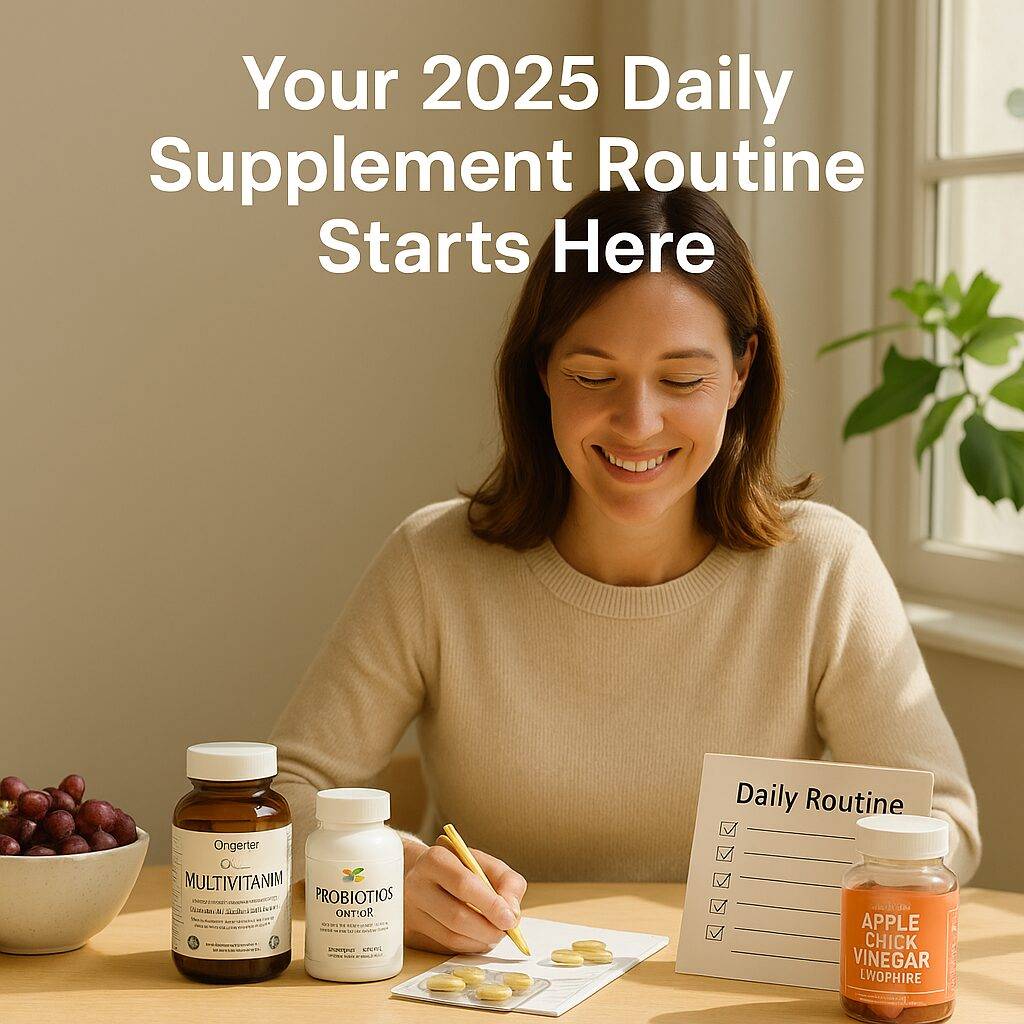Starting a daily supplement routine can be overwhelming, especially with so many options on the market. Whether you’re looking to boost energy, support your immune system, or improve digestion, this guide simplifies it all. Here’s how to get started with the most essential supplements.

Table of Contents
Toggle1. Start Your Daily Supplement Routine with a High-Quality Multivitamin
Multivitamins provide foundational support for energy, immunity, and metabolism. They fill nutritional gaps that often result from modern diets lacking in whole foods and variety.
Choosing the right multivitamin depends on your age, gender, and lifestyle. For instance, older adults typically require higher levels of Vitamin D and B12 due to reduced absorption. Women of reproductive age may need more iron, while men should avoid excessive iron unless prescribed.
Look for formulas that offer nutrients in bioavailable forms such as methylated B vitamins and chelated minerals. Avoid artificial additives and instead opt for whole-food-based sources that are easier for the body to digest and use effectively.
Learn more from Harvard’s Guide on Vitamins.
2. Support Your Gut with Probiotics
Probiotics help balance gut flora and support immune health. A healthy digestive tract can absorb nutrients better, regulate inflammation, and reduce bloating.
A good probiotic supplement contains multiple strains like Lactobacillus and Bifidobacterium, which are known for their benefits in gut balance and digestion. When taken consistently, probiotics can improve bowel regularity and reduce issues such as gas and discomfort.
Ideally, take probiotics with food to maximize survival through stomach acid. Plant-based blends often pair well with prebiotics to further nourish good bacteria.
Explore the scientific evidence on probiotics.
3. Boost Daily Energy with Magnesium
Magnesium supports muscle relaxation, stress reduction, and daily energy metabolism. It’s involved in over 300 biochemical reactions in the body.
Signs of deficiency include fatigue, irritability, cramps, and trouble sleeping. Magnesium glycinate is known for promoting calm and better sleep, while magnesium citrate may help with digestion.
Adults often don’t get enough from food alone, especially those consuming high amounts of caffeine, alcohol, or processed foods. Supplementing with magnesium can also help reduce tension and improve recovery from workouts.
Read more from the NIH’s page on Magnesium.
4. Strengthen Immunity with Vitamin D3
Vitamin D3 plays a critical role in immune response and bone health. It enhances calcium absorption and helps regulate inflammation.
Many people—especially those who live in colder climates or work indoors—are deficient without realizing it. Supplementing with 2000–5000 IU of D3 daily can help support immune resilience and reduce the risk of infections during winter months.
For best absorption, take D3 with a meal that includes healthy fats. Blood levels can also be tested to determine the right dosage for your needs.
Reference: PubMed study on Vitamin D3 and immunity.
5. Enhance Beauty from Within with Biotin
Biotin supports hair, skin, and nail health as part of your daily supplement routine. It aids in the production of keratin, a protein crucial for hair strength and skin elasticity.
Though rare, biotin deficiency can lead to brittle nails, thinning hair, and dry skin. Supplementing with 5,000–10,000 mcg daily has shown positive effects in appearance and texture for many users after 4–6 weeks of consistent use.
For best results, combine biotin with a protein-rich diet and hydration. Be cautious with multivitamin overlaps to avoid unnecessary high doses unless recommended.
See this PubMed study on biotin for hair health.
6. Detox Gently with Apple Cider Vinegar
Apple cider vinegar may help digestion, metabolism, and blood sugar control. It contains acetic acid, which may slow carbohydrate breakdown and reduce post-meal glucose spikes.
For those sensitive to the acidity of liquid ACV, gummies are an excellent alternative. They provide the same benefits without damaging tooth enamel or irritating the stomach lining.
Look for vegan-friendly options with added B vitamins like B9 and B12, which further support energy production and red blood cell health.
Read more at Healthline’s guide on ACV benefits.
7. Compare Daily Supplements & Shop Smart
Looking for the right supplement to start your routine? Use the table below to compare top daily picks based on health goals, form, and key ingredients. Click any product to learn more or shop directly.
| Product | Primary Benefit | Form | Key Ingredients | Shop |
|---|---|---|---|---|
| Organic Whole Food Multivitamin | Overall health & energy | Capsule | B12, D3, Zinc | View Product |
| Complete Daily Gummy Multivitamins | Convenient full-spectrum vitamin | Gummy | Omega-3, B12, D3 | View Product |
| Probiotics 60B CFU | Digestive & immune support | Capsule | Lactobacillus, Bifidobacterium | View Product |
| Magnesium Glycinate Capsules | Stress & sleep support | Capsule | Magnesium Glycinate | View Product |
| High-Potency Vitamin D3 5000 IU | Immune & bone support | Softgel | Vitamin D3 | View Product |
| Apple Cider Vinegar Gummies | Metabolism & digestion | Gummy | ACV, B9, B12 | View Product |
| High-Potency Biotin 10,000 mcg | Hair, skin & nail support | Softgel | Biotin | View Product |
8. Final Thoughts on Building Your Daily Supplement Routine
Establishing a daily supplement routine can significantly improve your long-term wellness when done consistently and with intention. While no pill replaces a healthy diet or lifestyle, supplements act as smart reinforcements—filling gaps, enhancing performance, and boosting resilience.
For beginners, the key is to start simple: begin with a quality multivitamin, add probiotics for digestion, and layer in targeted support like magnesium or vitamin D3 based on your needs. With time, you’ll better understand your body’s responses and can fine-tune your regimen accordingly.
Ultimately, supplements should fit your goals—not the other way around. Stick with whole-food options where possible, pay attention to ingredient transparency, and consult your healthcare provider if you’re on medications or managing chronic conditions. When used wisely, daily supplements can support energy, digestion, beauty, and immunity—helping you feel your best every day.
9. Frequently Asked Questions (FAQ)
9.1 What time of day is best to take supplements?
Most supplements are best taken with food. Multivitamins and probiotics work well in the morning with breakfast. Magnesium and biotin are often better tolerated in the evening.
9.2 Can I take all supplements at once?
You can, but splitting them up helps with absorption and reduces the chance of nausea or digestive upset. For example, take vitamins in the morning and magnesium at night.
9.3 How long before I see results from my routine?
It depends on the supplement. Probiotics and magnesium often show results within 1–2 weeks. Hair and skin supplements like biotin may take 4–6 weeks or more.
9.4 Do I need to take supplements every day?
Yes, consistency is key. Skipping days disrupts the routine and can reduce effectiveness. Make it a habit by pairing your supplements with meals or daily rituals.
9.5 Are there any side effects I should watch for?
Most daily supplements are well tolerated, but taking too much of fat-soluble vitamins (A, D, E, K) can be harmful. Always follow dosage instructions and talk to your doctor if unsure.
10. Related Articles You May Like:
- Sleep Mask Comparison – Silk vs Memory Foam Explained
- How to Choose the Right Pillow: Memory Foam, Gel-Grid, or Down Alternative?
- Herbal Magnesium Sleep Capsules for Better Sleep
Disclosure: As an Amazon Associate, HealthFitHub earns from qualifying purchases.

